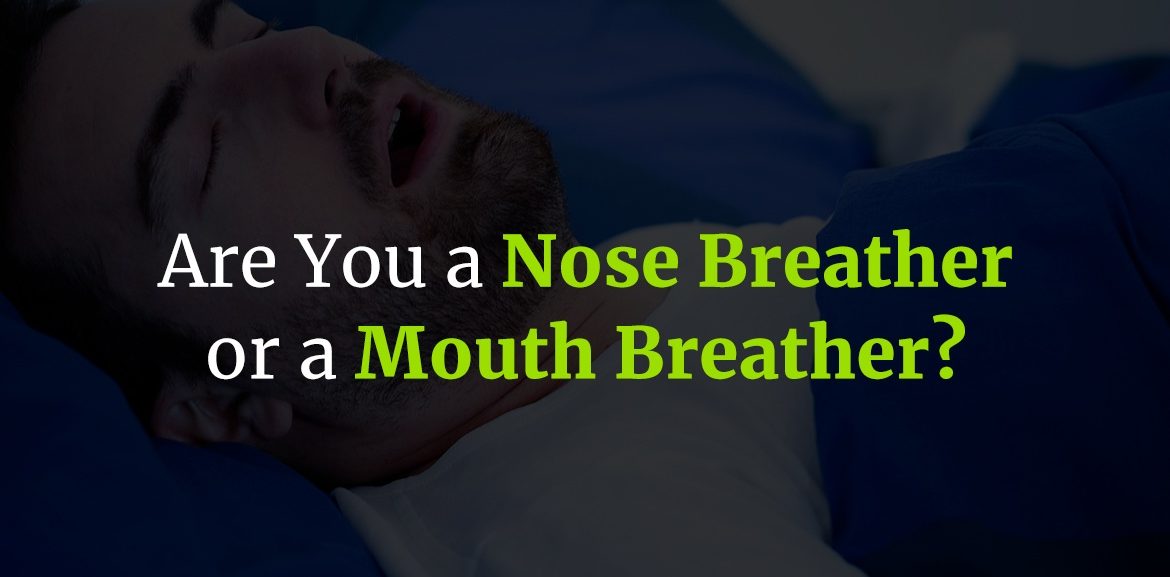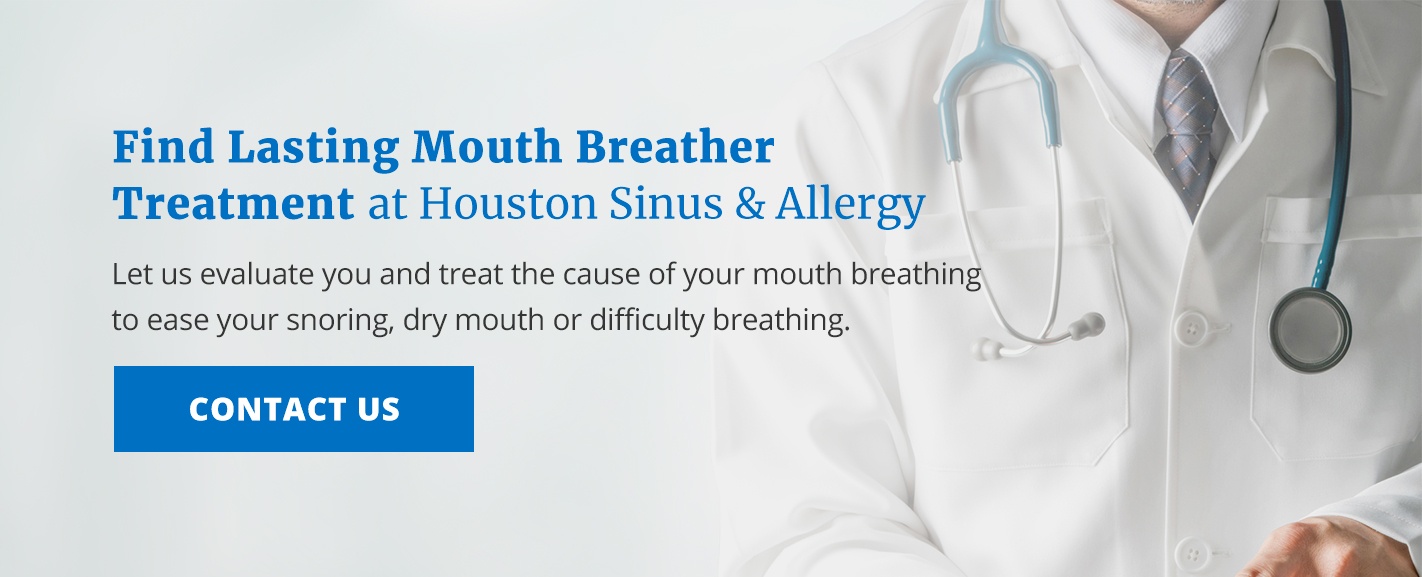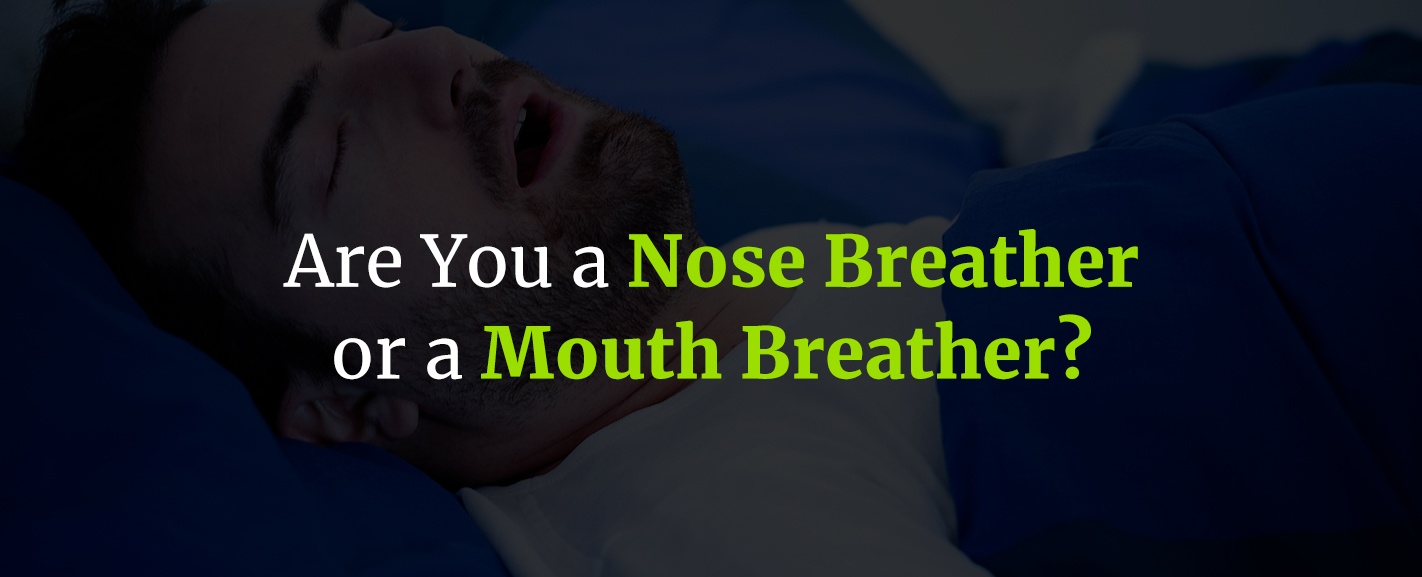
Do you know the differences between a nose breather vs. a mouth breather? Which one are you? Believe it or not, mouth breathing can have severe repercussions for your body. Find out why breathing through your nose is healthier and how you can get your body back to its natural breathing state below.
Why Nose Breathing Is Important
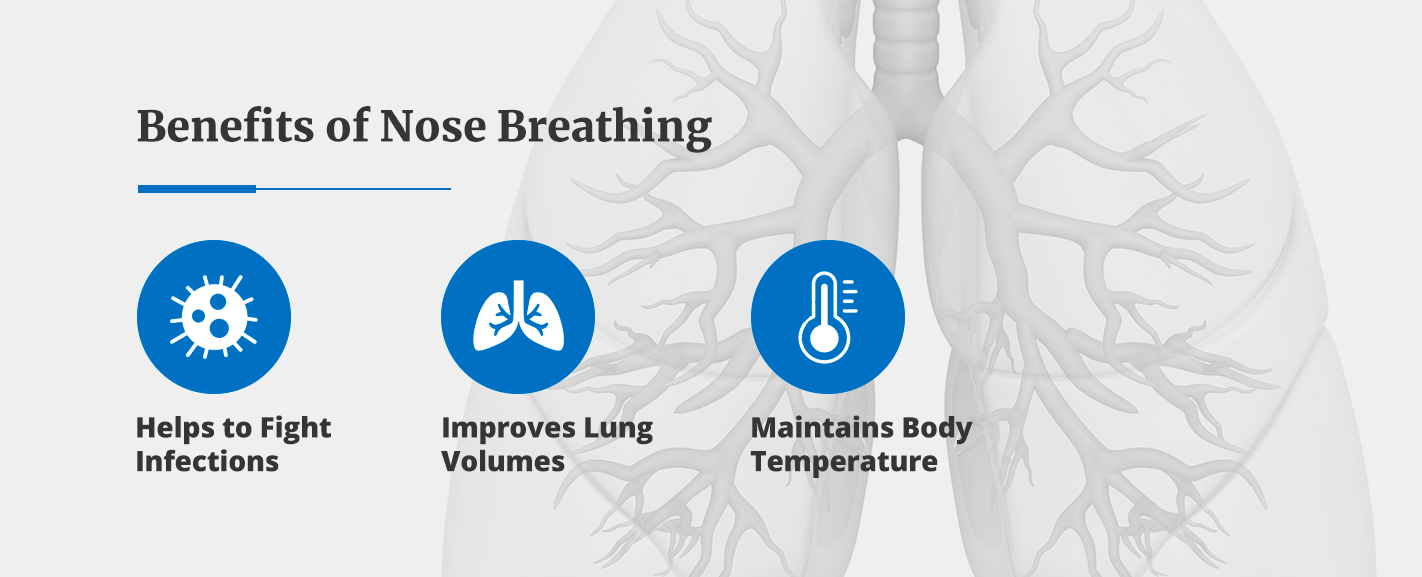
The nose has an ideal design for breathing. It does more than take in air. Through its structure, the nose also filters out disease-causing agents, improves lung volume and maintains body temperature. You naturally reap these benefits when you breathe through your nose, but you will lose them when you use your mouth for breathing instead.
1. Helps to Fight Infections
Nitric oxide produced by the nose has multiple benefits for your body. This oxide assists your immune system in fighting infections because it is antibacterial, antifungal, antiparasitic and antiviral. Additionally, your nose hairs filter pollen, dust and other allergens out before you inhale them into your lungs where they could cause irritation and breathing problems.
2. Improves Lung Volumes
The lungs draw air in and push it out. However, to attain the highest volumes of air inside them, the lungs need to work hard and build their strength. A study linked the nose to adding resistance to exhaling, which helped the lungs to hold in more air longer and increase their air volumes. If you breathe through your mouth, the air resistance provided by the nose vanishes, potentially reducing lung capacity.
In addition to increasing the amount of air your lungs can hold, nose breathing also improves the lungs’ capability to absorb oxygen. Nitric oxide comes from the nose, and this compound makes it easier for your lungs to take up oxygen and for blood to flow around your body. By dilating blood vessels, nitric oxide improves blood movement.
3. Maintains Body Temperature
Breathing through your nose acts as both an air conditioner and heating system for your body. When you inhale, the nose moistens and warms the air you take in. This warming action keeps cold air out of your lungs. One study showed that asthmatics who had cold-related breathing problems had less air intake when breathing in cold air and more air intake from warm air.
Mouth Breathing
Whether you are a nose breather or mouth breather does influence your health. If you don’t regularly breathe through your nose, you could exhibit some of the uncomfortable symptoms of mouth breathing. But mouth breathing causes more problems than these. Why you have this habit is just as important. For some people, mouth breathing could indicate a deeper problem that needs treatment.
1. Symptoms
A preference for using the mouth to breathe has numerous effects on your body, including on your appearance and physical health.
With prolonged mouth breathing, you do not retain as much moisture in your mouth, increasing both dental problems and bad breath. A dry mouth and throat may also affect your voice, making it sound hoarse. You may also have a hard time eating food quietly because you also need your mouth agape to breathe.
Should you be a mouth breather at night, you could snore and have trouble feeling refreshed even after a full night’s sleep. Those who breathe through their mouths have a higher chance of obstructive sleep apnea. Obstructive sleep apnea also causes snoring, sleeping problems and waking unrefreshed. It also may accompany depression, high blood pressure or leg swelling. Left unchecked, obstructive sleep apnea could worsen existing heart disease or result in heart attacks, strokes or heart failure. Because the causes of this form of sleep apnea and mouth breathing may overlap, treating mouth breathing that also comes with sleep apnea is crucial to your health.
If you are not sure about the cause of your symptoms, take this quick, 12-question mouth breathing test to find out.
2. Causes and Risk Factors
While mouth breathing may simply be a learned habit for some people, others do it because they cannot breathe through their nose. Temporary causes of mouth breathing include nasal congestion from colds, allergies or the flu. However, long-term use of the mouth to breathe could indicate any of the following:
- Deviated septum
- Nasal polyps
- Enlarged tonsils or adenoids
- Swollen structures that humidify and warm air in the nose (turbinates)
- Stress
- Anxiety
Finding the cause is critical for a doctor to help you to stop breathing through your mouth and avoid any potential problems caused by mouth breathing.
You could be at risk for breathing through your mouth if you have a condition that makes nasal breathing difficult. For example, if you have chronic allergies or colds that keep your nose congested, you may prefer to breathe through your mouth. The same holds if your nose has a shape that reduces airflow, either in the exterior or interior structure. Other risk factors for breathing through your mouth include having asthma or long-term stress or anxiety.
3. What It Means
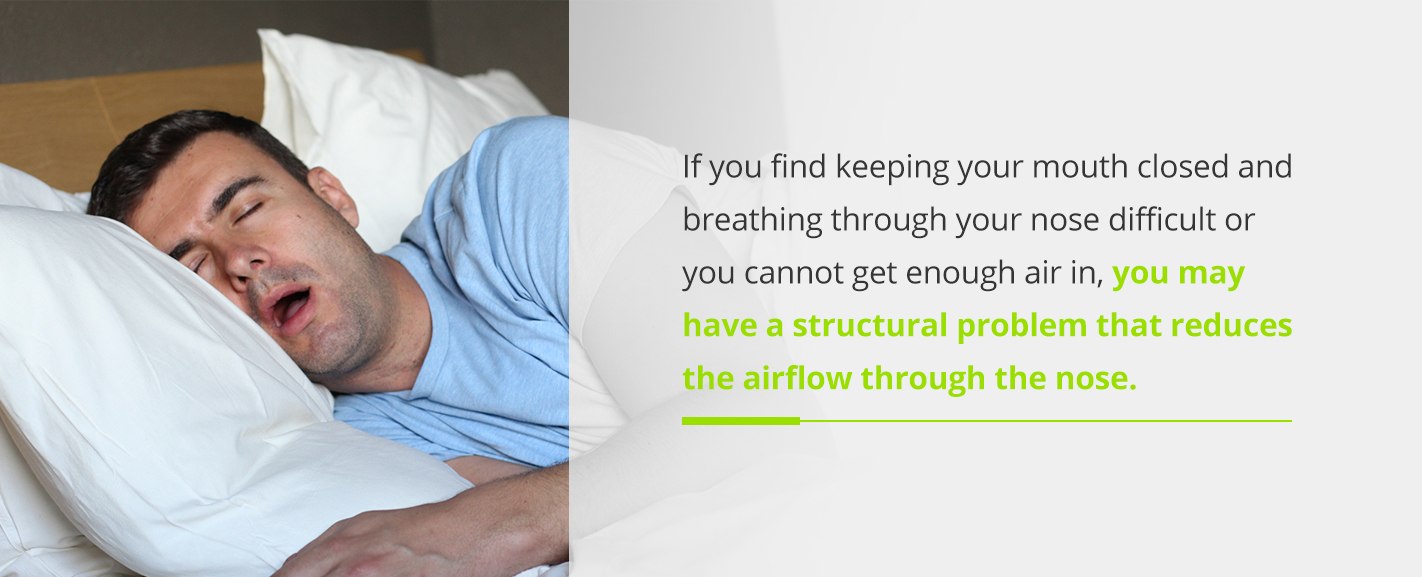
Breathing through your mouth does not always mean that you have a congested nose. If you find keeping your mouth closed and breathing through your nose difficult or you cannot get enough air in, you may have a structural problem that reduces the airflow through the nose.
Your body needs oxygen, and if you cannot get the air you need through your nose, you will naturally breathe through your mouth. Using your mouth to breathe increases your chances of dry mouth and dental problems.
While you can take a few measures to alleviate symptoms of breathing through your mouth, until you get treatment, correcting the cause will give you long-lasting results.
At night, use a humidifier in your room and rub vitamin E oil on your gums. These measures will prevent excessive drying in your mouth. During the day, drink water frequently to keep yourself hydrated.
Brushing your teeth, using mints or chewing gum, though, likely won’t correct bad breath caused by breathing through your mouth. If you have a bad taste or odor from your mouth despite good oral hygiene, make an appointment to see a doctor sooner rather than later. The unpleasant smell comes from bacteria in the mouth that your saliva does not remove. The bacteria can also cause gingivitis and cavities, even if you regularly brush and floss.
Some people develop mouth breathing from obstructive sleep apnea. Sleep apnea causes you to stop breathing at several points during the night. When you start breathing again, it likely is through the mouth. One study linked mouth breathing relief to treatment for sleep apnea. You may find relief from mouth breathing at night through the use of a nasal continuous airway pressure (nCPAP), which forces air through your nose, preventing sleep apnea.
If you have a new diagnosis of sleep apnea, you may start on a full-face mask to accommodate mouth breathing, which many doctors use as the default because so many of their patients breathe through their mouths. Over time, you may graduate to a smaller mask or an nCPAP with a chin strap to keep your mouth closed as long as you do not have nasal obstructions that prevent nasal breathing.
4. Why It Is Important to Fix
Without correction, mouth breathing can have serious complications. As noted, you could have sleep apnea accompanying your mouth breathing as a consequence or a cause of how you breathe. Sleep apnea comes with a range of complications, such as heart disease and stroke.
Even if you do not have obstructive sleep apnea, you may still have another pressing reason for using your mouth to breathe. For example, if you have a nasal structure that prevents you from breathing through your nose, you may have reduced lung function or not get adequate oxygen. Those with asthma may find their problem worsens.
Keeping your mouth open all the time to breathe could also lead to problems with your jaw joints and how your teeth align.
Instead of living with the discomfort and potential complications of continually breathing through your mouth, you can get treatment for the underlying causes and breathe freer and more naturally through your nose.
5. How We Diagnose It
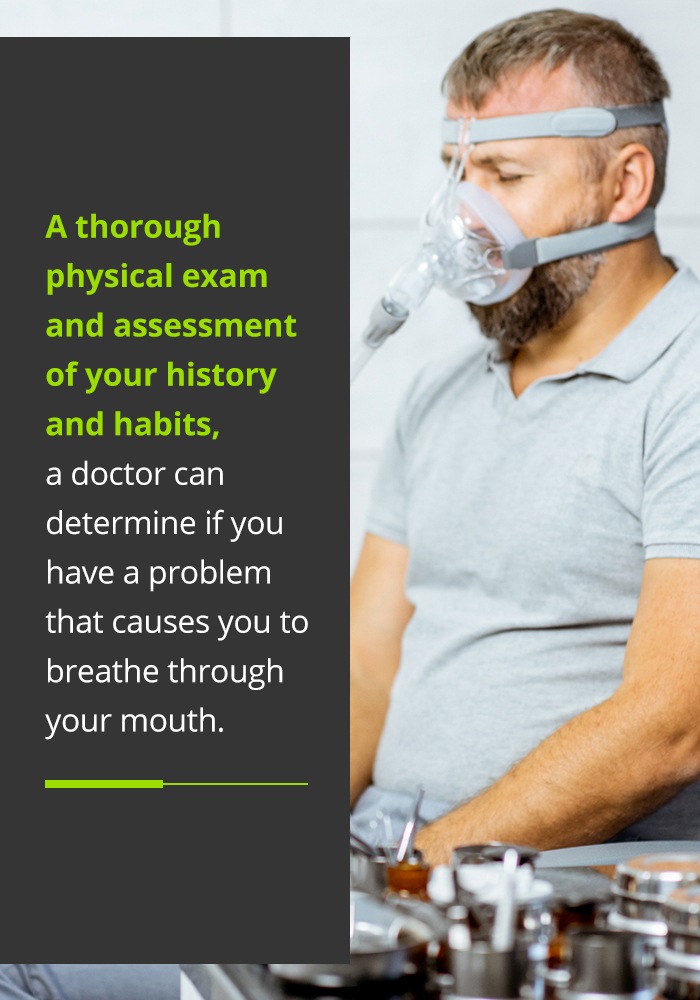
Doctors do not have a single test to determine if you are a mouth breather. However, a thorough physical exam and assessment of your history and habits, a doctor can determine if you have a problem that causes you to breathe through your mouth. Physical signs such as swollen nasal passages, enlarged tonsils or adenoids are visible during an exam of your nose and throat. Your doctor may also note that you keep your mouth open during the exam to breathe.
If you already know that you have a condition that keeps you from comfortably breathing through your nose or if you snore, you can start with an ENT specialist who can evaluate you and determine the best course of treatment.
For a possible case of sleep apnea, your doctor may schedule you for a sleep study. This test requires you to sleep at a clinic overnight. During that time, doctors evaluate your vital signs to see if you stop breathing during the night, indicating that you have a form of sleep apnea. If you have a partner who reports that you snore and stop breathing in your sleep, this information will help the doctor to determine if you have sleep apnea.
After a diagnosis of the cause, the doctor has the information they need to decide on the best treatment options for you.
6. How We Can Fix It
Fixing cases of mouth breathing start with the cause. If you only breathe through your mouth occasionally, such as during allergy season, you may only need antihistamines and decongestants to keep your nasal passages open.
If you have sleep apnea, your doctor may prescribe you a CPAP to help you to breathe while you sleep. These masks cover your mouth or nose and force air into you to ensure that you do not stop breathing at night. Though slightly uncomfortable at first, the improved sleep and prevention of sleep apnea complications make up for any minor issues wearing the mask.
Should you breathe through your mouth due to stress or anxiety, relaxation exercises, yoga or therapy could help you. These options help you to become more conscious of your breathing and learn how to correct it to be healthier.
For issues with enlarged tonsils or adenoids, you may need surgery to remove them. An ENT will determine whether this type of procedure will help you to breathe better through your nose.
For other physical conditions that cause blockages in your nose, such as swollen turbinates, a deviated septum or nasal polyps, in-office sinus surgery could help.
For swollen turbinates, you may need surgery to reduce these structures. Doing so will allow more air to flow through your nose.
If you have a deviated septum, a doctor may recommend a procedure known as septoplasty. This procedure straightens out the cartilage in your nose to remove any blockage. Some people have a deviated septum from birth, while others develop it after an injury. The result of having this condition is difficulty breathing through your nose, snoring and noisy breathing. Using either local or general anesthesia, the doctor performs the procedure in the office. It only lasts around two hours, and you can go home the same day. Since the operation uses small incisions and does not cut into significant blood vessels, recovery occurs quickly, and you get breathing relief as soon as any minor surgical swelling subsides.
For minor cases of nasal polyps, you could find relief through medication to shrink the polyps. In some instances where medication does not work, you may need sinus surgery to remove them. Unfortunately, polyps tend to return. Still, early recognition and treatment of returning nasal polyps allow your doctor to reduce them through medication before they get too large and block your breathing.
Find Lasting Mouth Breather Treatment at Houston Sinus & Allergy
Mouth breathing could indicate a more significant problem. The good news is that doctors have numerous treatments available to correct the problem by getting to its cause. Let us evaluate you and treat the cause of your mouth breathing to ease your snoring, dry mouth or difficulty breathing.
Our fully outfitted office at Houston Sinus & Allergy has the equipment needed to assess your breathing and determine the best mouth breathing treatment for you. We also can perform a variety of surgical procedures in our office to correct the causes of mouth breathing and snoring. You don’t have to go to a hospital to get surgical treatment for your sinus or nasal problems.
If you live in Houston, Cypress or Jersey Village and have problems with using your mouth for breathing, contact us at Houston Sinus & Allergy to book an assessment.

